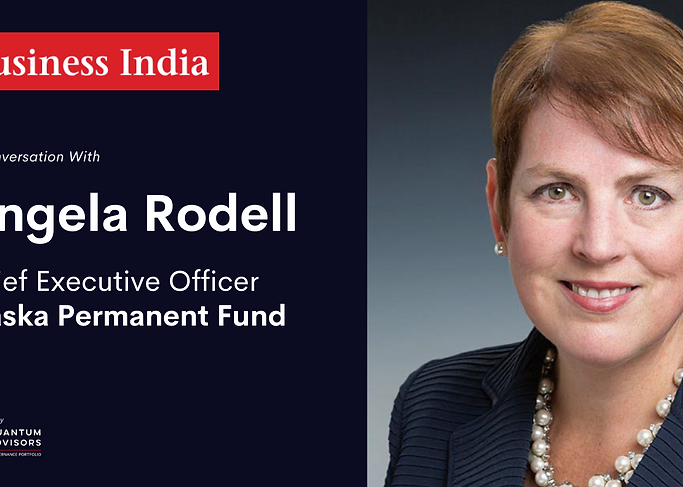Angela Rodell, CEO of Alaska Permanent Fund on climate impact and transition.
With COP26 in full session in Glasgow, Angela Rodell, CEO of Alaska Permanent Fund, talked to Quantum Advisors' Chirag Mehta and Ajit Dayal on behalf of Business India's Climate Change Weekly.
As a resource-oriented state, Alaska is subjected to many of the issues of climate change. Ms. Rodell covered APF's activities and policies - from engaging portfolio companies on climate transition to the collective action institutional investors could take to address climate action.
Transcript
Chirag Mehta (00:06):
Greetings everyone. This is Chirag Mehta from Quantum Asset Management. COP26 is an important milestone in the fight against climate change. There have been few positive outcomes from the past climate gatherings, but much needs to be done. To quote Naomi Klein, "Climate change is a civilizational wake-up call, a powerful message, spoken in the languages of fires, floods, droughts, and extinctions, telling us that we need an entirely new economic model and a way of sharing this planet, telling us we need to evolve." Business India Climate Change Weekly, published by Business India, will host a series of interviews as we approach COP26 and beyond, to get a sense of how various individuals and organizations are preparing for the new world of planet, people, and profit. We have with us today, Angela Rodell, from Alaska Permanent Fund Corporation to share with us her perspective on climate and ESG issues.
Chirag Mehta (01:31):
To introduce Angela, she serves as the Chief Executive Officer of the Alaska Permanent Fund Corporation, APFC as it's called, since 2015. APFC is a state corporation based in Juneau, Alaska that manages and invests the Alaska Permanent Fund and other funds designated by law. As CEO, Ms. Rodell is leading APFC at a pivotal time in history, as it emerges as a revenue generating center for the state of Alaska. Since Angela became CEO of APFC, the fund has grown by more than 50% with the fund value totalling close to 80 billion dollars now.
Chirag Mehta (02:12):
The fund won numerous awards, including North American Limited Partner of the Year for 2017, 2018, and 2020 from Private Equity International, along with the recognition by PEI's Private Debt magazine, as one of the 30 most influential investors in public credit in 2018. In 2019, Ms. Rodell received global recognition as #4 among 100 of the most “significant, resilient, and impactful asset owner and public executives” from the Sovereign Wealth Fund Institute.
Welcome Angela and thank you for joining us today.
Angela Rodell (02:55):
It's a real pleasure to be here.
Chirag Mehta (02:57):
And to make conversation more interesting, I am joined by Ajit Dayal, founder of Quantum Advisors, and I will request Ajit to kickstart this fascinating conversation with Angela. Over to you, Ajit.
Ajit Dayal (03:14):
Thank you, Chirag. Great to see you, Angela. Although for now, it's only virtually. One day, I have to take that cruise to come to Alaska and to meet up with you. Lets Start off by getting a bit of history on the Alaska Permanent Fund, you manage as Chirag said nearly 80 billion, and you've used the past returns to pay out approximately $1,600 per resident of Alaska annually since inception. And you have been described by some as the first basic income fund in the US. So a capitalist society has a social instrument or basic instrument fund. Could you give us a bit of history and background on the source of wealth of APF? Or kind of where did the money come to start with?
Angela Rodell (04:04):
Sure. I'd be happy to. So Alaska is one of the newer states in the United States. We became a state in 1959, so a relatively young state. Part of that agreement and acceptance into the United States is to demonstrate the ability to support yourself as an independent state within the other 48 at the time. And we were able to demonstrate that support because oil had been found up on the North Slope, north of the Arctic circle in Alaska in 1969. So 10 years later, we had our first lease sale of those assets, and it generated 900 million dollars.
Angela Rodell (04:49):
Now, it was important that when we became a state, we did not allow private individuals to retain the rights to subsurface minerals. So all of those were determined to accrue to the state benefit, to the collective community at the time, in an effort to support a very diverse and geographically large state. The pipeline to transport that oil was built in the early 1970s.
Angela Rodell (05:23):
And in 1976, the voters of Alaska determined it was really important to save at least 25% of our royalty income off of these resources, to allow a non-renewable resource to generate perpetual benefits through the mechanism that is finance, that is money. So as a part of that discussion about what to use the permanent fund for in 1980, the legislature adopted this idea of ensuring and spreading that wealth among all citizens of the state of Alaska. Every man, woman, and child that lives in Alaska is allowed to apply and receive what we call the Permanent Fund Dividend.
Angela Rodell (06:13):
Today that has shifted somewhat. So not only do we pay for a Permanent Fund Dividend, the Permanent Fund is now used to supply 70% of all unrestricted general funds spending for the state of Alaska. So we're supporting our communities through education, through public safety, and through all of those services that we rely on from our state government. We pay out a little over three billion dollars a year for that purpose.
Ajit Dayal (06:44):
That's fantastic. So I was quite amazed to know that, I know Alaska is a big land with a few number of people, but when I read that there are about 400,000 people employed in all of Alaska, that's kind of a neighbourhood in my city of Bombay. And then I read that about a third of those work in the government, a third in the oil and gas sector, and a third everywhere else, including tourism.
Ajit Dayal (07:11):
So how do you see the challenges for Alaska as the oil and gas runs out, jobs become scarcer? You know, are you looking at reskilling or is there hope that the government may change the role, the laws and give further acreage for drilling for new finds to protect the job? So how will you manage that sort of bane of society versus the opportunity of new jobs as the oil runs out?
Angela Rodell (07:36):
Yeah, I think, Ajit, you're hitting on one of the hardest questions Alaska is facing today, which is how to be a part of the transition, as we watch headlines around the world of banks refusing to invest in the Arctic or not looking at the Arctic in an effort to talk about climate change, which is very important. I don't want to diminish in any way the importance of climate change. We have to remember the social costs and the impacts on real people today, as a result of some of these positions.
Angela Rodell (08:10):
And where we need to go in Alaska is that as a US state, we are subject to some of the most stringent resource development rules in the world, and we have the infrastructure in place, and that fossil fuels will continue to be a part of the transition. We are not going to walk away from oil and gas tomorrow and leave people in severe energy poverty, creating significant, even greater income inequality and social unrest as a result of that.
Angela Rodell (08:44):
So I think it's really important that as Alaska, that we think about the transition. That we think about what that looks like, how we can work with the companies to continue to develop the resources on the North Slope, and also be a part of any new technologies, pilot projects, things that will use perhaps old infrastructure with new resource intention and really start to transition. It will require some reskilling in a lot of ways. Tourism is not going to cover the gap. When we look at wages in and of themselves, wages for a pipe-fitter, welder on the North Slope are significantly higher than for a hospitality worker, working seasonally in tourism. It's just not the same.
Ajit Dayal (09:36):
Yeah. You know, again, we have the larger scale problem in India. So before Chirag reads the next question, just to give the sense of it in India, we're going to be using coal to power, half the economy, half the country, probably by 2050. And no matter what you do, that is a reality of life. And again, as you shut down the coal plants, there's unemployment and all that stuff. So there is that transition as you correctly pointed out, but again, you've got to worry about 400,000 people, and a third of those. In India, we have to worry about a few hundred million people, and that as we kind of transition from all fossil fuels into new kinds of technology for new fuels. Maybe with that Chirag, do you want to...
Chirag Mehta (10:22):
Yeah, sure.
Ajit Dayal (10:22):
Sorry, Angela you were saying something on that...?
Angela Rodell (10:25):
No, I'm good.
Ajit Dayal (10:26):
Okay.
Chirag Mehta (10:27):
Sure, coming now towards investing, as this is evident that temperature in Alaska and many parts of the globe have been rising over years and as evident from the wildfires in the US to, famines in Madagascar, to floods in Asia, climate change is manifesting in different ways. Are you engaging with your companies in your portfolio that are linked to say GHG emissions, water usage, different traits of the environment?
Angela Rodell (10:57):
No, we are not. We do not take a formal climate change policy from an investment perspective. I think one of the things that is really important to note is that we have been investing now for 45 years. We were created to invest in perpetuity. We will be looking, through due diligence, at companies that have the ability to withstand, maintain, sustain themselves, adjust, adapt to different climates, to different business environments in all of this. And so that is how we are taking our approach to investing on this front. We are not activist investors on this front.
Chirag Mehta (11:45):
Understood, but there is this classical debate, right? Is it developed or emerging markets, where the focus needs to be? Like for example, while the current climate change issue is largely a result of consumption habits in the developed economies like US, Europe, Japan, et cetera, the next 20, 30 years emerging economies will contribute significantly if you don't fund their growth so that they achieve prosperity as well as grow sustainably. So has the time come to shift the debate on climate change to emerging economies with a large population base?
Angela Rodell (12:22):
Absolutely. I do believe it's time to shift focus to those economies when we look at the opportunities set, whether it's in Africa, India's and other places, there's tremendous opportunity to make a huge impact with very few dollars in a lot of ways. I mean, if you look at some of the issues in Africa, both from a demographic growth perspective, but then you take a step back and look at fuel for cooking fires and clean water. There's tremendous opportunities to invest in these places. I think the biggest challenge will be the governance around those investments in being able to withhold or enforce our rights as an investor in some of these places. There's a lot of risk in investing in these places, but there's tremendous upside as well.
Chirag Mehta (13:17):
Sure. Completely understand that you are supporting those opportunities and trying to look at those economies as well. So it's good to hear on that front. Now, if you shift focus to a broader ESG discussion for climate towards more broader ESG, do you think passive strategies would work, given that benchmark indices are created with market cap and liquidity in mind to maximize utilization and the AUM capacity of an index, or will there be a search for more active managers who can identify the winners of ESG and build portfolios at a low cost as APFC and you all have been doing over years, with your other investments?
Angela Rodell (13:59):
You know, I think the real challenge with the passive investing on this front is that the benchmarks don't reflect an ESG goal. So as we look towards changes that happen in how disclosures get regulated, for example, the Nikkei adopting climate requirement disclosures, I know the SEC is looking at including climate disclosures as well from US listed companies, to the extent that can then be incorporated into the benchmarks and reflected. But I feel like that's a much longer time horizon than what we can do by creating bespoke solutions with active managers or in the private market space.
Angela Rodell (14:50):
So I think in the short term, you're going to see a lot more emphasis within that private market and active manager space. It'll take a long time for the passive benchmarks to catch up because the indices, MSCI and others, Russell 3000, et cetera, will want to have a common scoring system that is accepted by everyone on this front before they adopt it into the indices. And so maybe having those regulatory requirements will aid in that process.
Chirag Mehta (15:23):
Yeah, it is currently difficult to build consensus and therefore active looks like a better place to be. But coming to the classical debate of is there a risk return trade off in case the portfolios ask to focus more on ESG? And how do you manage a socially responsible portfolio with APF's social obligation to the people of Alaska via the dividends that you pay out?
Angela Rodell (15:52):
Yeah, no, I think our S focus is so much on the people of Alaska that it's important that we generate really good returns and that they're risk adjusted returns. Does that risk adjustment need to include climate risk? It needs to be discussed. We need to be aware of it, but our first and foremost goal is actually on the "S" in ESG, and it's on our social compact contract with the people of Alaska.
Angela Rodell (16:22):
And it's not just delivering on the dividends, as important as those dividends are to individual Alaskans, but it is the reliance on us to fund schools and education. It's the reliance on us to provide state troopers. It's the reliance on us to have biologists monitoring our fisheries and our commercial fishery industry. So there is a huge "S" in our focus, and that's what we are trying to continue to sustain and support at the Alaska Permanent Fund.
Chirag Mehta (16:58):
Sure. But in this whole ESG do you think there's a risk return trade off?
Angela Rodell (17:04):
I'm sorry, Chirag, can you repeat that question?
Chirag Mehta (17:06):
Yeah. Just want to reiterate in this whole debate, is there a risk return trade off involved? If you go the ESG investment route?
Angela Rodell (17:17):
You know, I don't know. I don't know the answer to that, because we have never looked at it through that lens. We are looking for the best possible returns and we are looking at a very long timeframe. So I believe we are taking in the appropriate risk and calibrating our portfolio as a result. And so I can't say one way or the other that ESG either costs or enhances returns in any way for us.
Ajit Dayal (17:46):
Yeah. So, just to sort of take that thought process further, right? It was a lot easier 20 years ago to be an asset allocator. Simple, you came there, you picked the stats, you picked the portfolio, picked the manager and life was easy. Now you have all these pressures, from apathy, to gender, to climate.
Ajit Dayal (18:04):
And you said about your focus being on the social wellbeing of people within Alaska and you spoke about measuring biodiversity, the quality of fish, et cetera, et cetera, but in the climate world, in some sense, bad air from India or China, Indonesia will kind of find its way to Alaska and the North Pole, or bad air or bad water, et cetera, et cetera. So eventually someone in Alaska could be affected by what's happening in other parts of the world.
Ajit Dayal (18:36):
Therefore, if you look at the problem that you face today, sort of protection of Alaskans also may include an asset allocation bucket, which we branded as Save My World allocation bucket, because the more traditional allocation buckets of private equity, unlisted stuff, illiquid stuff, infrastructure, then the listed assets, public debt, et cetera, et cetera, they may not be able to solve that problem of that local Alaskan waking up and saying, "I can breathe and smell fresh air, and I'm getting fresh fish."
Ajit Dayal (19:13):
And maybe we should ask Angela to put 1% of our pension money or the corpus into kind of a Save My World fund, which ensures that technologies are available around the world so that I in Alaska can continue getting fresh air. Do you think it's time to start thinking in that sense, in that way?
Angela Rodell (19:32):
Here's the challenge I would put back to you on that, Ajit, is that we're already feeling that. If you come to Juneau, you'll see the effect on our glaciers. You'll see the effect on our fisheries, with how they have shown up and presented themselves, warming of the oceans. We're seeing glacial rebound. So we don't actually see ocean levels rising as much as land levels rising as the glaciers retreat.
Angela Rodell (20:02):
So we feel the effects, but as you pointed out, we are a very small population relative to the world. And what we need from the world is we need India, we need China, we need all of the lower 48, Europe really investing in Save the World, the true populations. I think we are doing our part. We do invest in India. We do invest in China. We do invest in Africa.
Angela Rodell (20:31):
We are looking for an opportunity set there, but I don't think eight billion dollars from the Alaska Permanent Fund, which is 10%, or even 800 million dollars, is going to effectively change, save the world. And what we need in Alaska is we need the rest of the world to step up, and retreating from the Arctic, not investing in the Arctic, doesn't help us. It doesn't save the world, retreating from that investment, but rather it has to be thoughtful investment. It has to be thoughtful investment in the Arctic, and it has to be thoughtful investment in India as well, and where the change is really going to happen is in your world to save the world.
Ajit Dayal (21:16):
Well, true. I mean, if I just sort of take that up quickly, I know we've only got a few minutes left. But if you think about it, if there's 270 trillion dollars, which is managed by the sovereign funds and the pensions and university endowments and the foundations and the hundred richest people in the world, if they collectively put 1% of that, 270 trillion to work every year, that's 2.7 trillion and your 800 million is a very nice contribution to get to that 2.7 trillion. I mean, imagine the sort of funding...We saw during COVID, we saw how a vaccination was funded and created in universities and by small companies. Imagine the creativity that can be funded with that pool of capital, which will then give you the right solutions. And which will then give you sort of better outcomes for everyone, including for those in India and those in Alaska.
Angela Rodell (22:08):
Ajit, I think what would be really interesting, because you're talking about it as a collective pool that can be tracked and monitored and measured performance against in terms of... I mean, when we sort of talk about it collectively, I can point to 800 million dollars of investments around the world that would fall into your definition of save the plan.
Ajit Dayal (22:29):
That's basic, yeah.
Angela Rodell (22:30):
We just don't categorize things that way. We were a seed investor in some of the biotech stuff that led to the vaccines. We were a part of that. We have a whole host of investments that I could add up to well over...We just don't categorize it and sell it that way because our mandate is to generate returns and we want to make sure that the focus continues to be on the social deliveries that we're required to do for Alaskans.
Ajit Dayal (23:01):
So we'll maybe move to the last question, we're running out of time. I know there's COP26 coming up, and Chirag had a question on COP26 for you.
Chirag Mehta (23:10):
Yes, so Angela, if you had three recommendations for COP26, what would those be?
Angela Rodell (23:18):
What I want for COP26 is to recognize the uniqueness of the Arctic: 4 million people, eight countries surrounding a body of water that needs to have a true energy transition, carbon transition. I want them to recognize energy poverty around the world is real. It's real in the United States. It's real in Alaska. It's real in India. And that to make true change is we have to recognize that energy poverty, and we have to make sure we don't create a social inequality gap, even wider as a result of our efforts to combat climate change. So I would love to see proposals for true energy transition. And I can't think of a third one off the top of my head, Chirag, but I think both of those are just very real, very high, important aspects from where I sit in Juneau, Alaska.
Chirag Mehta (24:18):
Sure, Angela. I hope COP26 is listening to that loud and clear. And to end today's great conversation, I'll just quote Christine Lagarde where she kind of said that “it's a collective endeavour, collective accountability, and it may not be too late”. And that is what I make from this conversation today. It's a collective thing. And if we all collectively do things towards a common objective, we all will achieve it. So thank you Angela so much for joining us today and sharing those insights with us.
Angela Rodell (24:50):
Thank you. It was a real pleasure.
Chirag Mehta (24:51):
Thank you, Ajit for joining.
Ajit Dayal (24:52):
Thank you, Angela. Thank you Chirag. Thank you.















